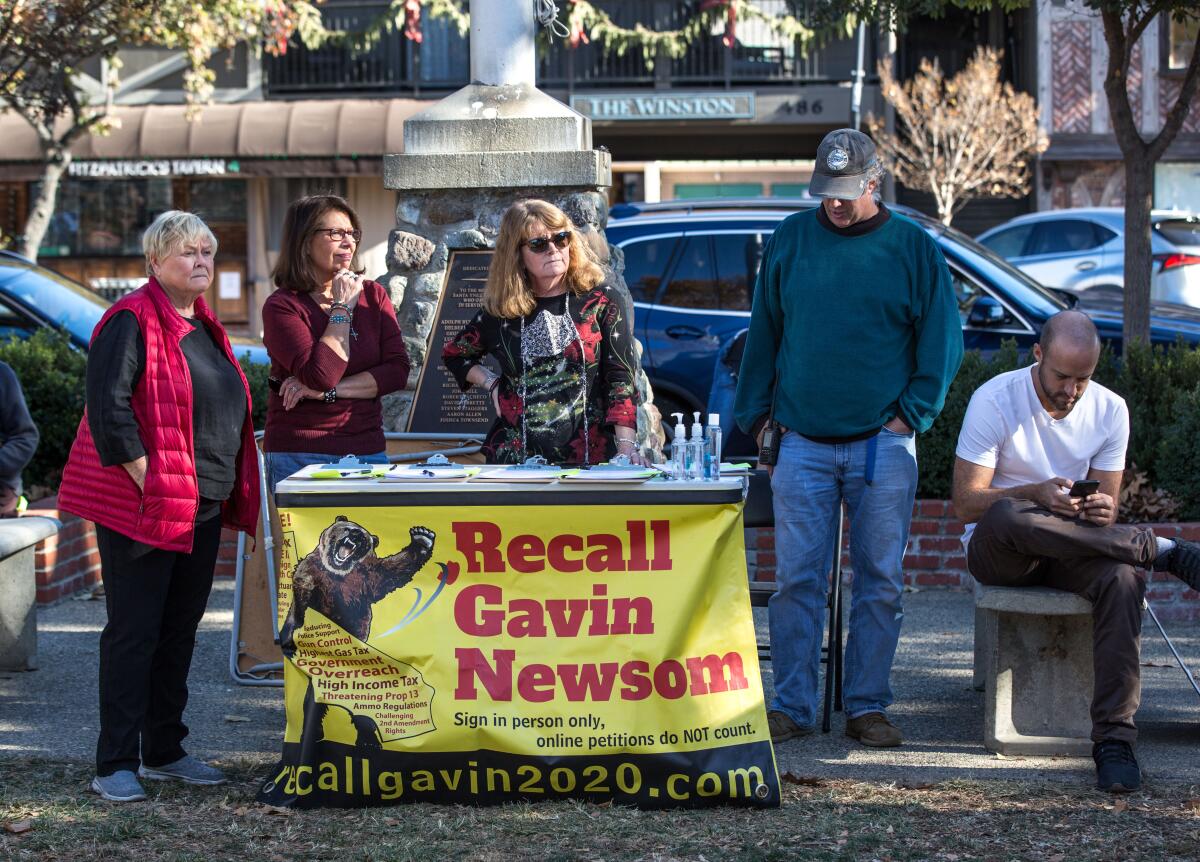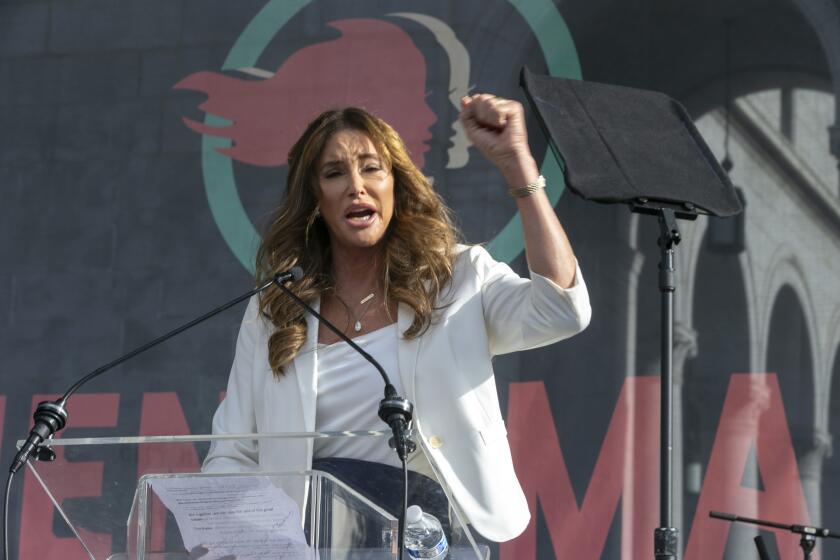Sigh. The bitter, costly — and probably very silly — recall nightmare begins

- Share via
Oh no. California is in for it now.
State election officials confirmed Monday what everyone expected: that recall proponents have turned in enough valid signatures to force a special election to decide whether Gov. Gavin Newsom should remain on the job.
Though the signature verification process will continue until April 29, county election officials have submitted their latest count of verified recall petition signatures, and the total exceeds the nearly 1.5 million required by law — equivalent to 12% of the votes cast in the last gubernatorial election.
This was no surprise, since the recall organizers submitted 2.1 million signatures for a safe buffer against bogus signers. Nevertheless, now that the hypothetical has become reality, it’s starting to sink in that California is about to suffer through a long seven months of recall-related campaigning as this calamity unfolds.
And who can we thank for this miscarriage of the state’s direct democracy system? A small group of conservatives aided by a motley assortment of Donald Trump supporters, QAnon believers, anti-vaccine activists and COVID-19 deniers who seem to think that recalling Newsom will somehow lead to a far-right renaissance in this deeply blue state. The lead organizer is a retired Yolo County sheriff’s sergeant who was banned from Facebook last year, apparently for his association with a “militia-type” group and a faction that spread misinformation about masks and vaccines, according to the San Francisco Chronicle.
The election of those celebrities were an exception. In California, political experience tends to win.
This recall never should have happened — and probably wouldn’t have gone forward at any other time. Even with the state’s generous recall petition circulation period of 160 days, the effort was lagging until a judge in November granted a four-month extension. Another stroke of luck: Those four months corresponded with one of the darkest periods of political discourse in the nation and the deadliest period of the COVID-19 pandemic. People were scared and angry and looking for someone to blame.
But this recall is not about Newsom’s handling of the pandemic, or at least it didn’t start out as one when it was launched in February 2020. All one has to do is read the small print of the recall petition (literally — it’s tiny) to understand that Newsom was targeted for governing like a California Democrat, which is what voters expected when they gave him an overwhelming victory in 2018.
No, what at least 1.5 million California voters signed up for — wittingly or not — is an attempt by a right-wing minority to overturn the will of the majority by hijacking a process intended to be used only in extreme cases of malfeasance or incompetence by the state’s top executive. What’s more, if a majority of voters agree to oust Newsom, he will be replaced by whichever candidate on the recall ballot draws the most votes, even if he or she draws far less than 50%. That means a governor supported by most Californians could be replaced by one chosen by a sliver of them. That’s not just trouble for California’s future, it’s undemocratic.
There is still one chance to stop the recall, though the likelihood of it succeeding is slim. A campaign headed by former state Senate leader Don Perata called Stop the Steal California (turning Trump’s baseless election-fraud rallying cry on its head) is hoping to convince enough petition signers to withdraw their names to force the election to be called off.
Success will depend on a number of things, starting with getting access to the petitions in order to identify and target signers before the 30-day withdrawal period passes. The campaign argues that under a 2004 state constitutional amendment (Proposition 59), those documents should be accessible to the public; it plans to go to court to get them if need be. Then it would need to convince 100,000 people or more to sign a withdrawal form and submit it to their county elections office. Still, good luck to the organizers for trying to avert a costly, destructive and unnecessary election at a time when Californians are trying to heal from the political, economical and biological assault of 2020.
More likely California will have to face this calamity head-on for the next seven months as the campaigns kick into high gear and dozens (hundreds?) of candidates join the political circus. Though there are three veteran Republican politicians who have declared their intention to run, the celebrities and oddballs are starting to turn out, as they did during the only other recall in state history, in 2003.
In that race, 135 people vied to replace Gov. Gray Davis, including, of course, movie star and ultimate winner Arnold Schwarzenegger. A fair number of pseudo-celebrities joined in the fray as well, knowing that they didn’t have a shot at winning but hoping that participating in the national news spectacle would burnish their careers. Two of them — adult film actress Mary Carey and Angelyne, who is famous for being on a billboard — say they will run again this year. At this point, the biggest name is Caitlyn Jenner, a gold medal Olympian, transgender activist and member of the extended Kardashian clan, though she has no more experience in office than Carey or Angelyne. Which is to say, she has none.
The recall election might be good for the careers of a few candidates, but it won’t be great for Californians, who will have to endure what is likely to be months of invective, silliness and contentious debate in a year when they were supposed to get a break from all that. And for what? If Newsom survives the recall, state taxpayers will have spent as much as $400 million (in addition to the untold millions ponied up by campaign donors) on a special election that changed nothing. If he loses, he’ll be replaced by someone who hasn’t just led the most populous state in the nation through the worst crisis in recent history and who will instantly have to start running for the regularly scheduled gubernatorial primary a few months later. No matter how you cut it, in this election, Californians lose.
More to Read
A cure for the common opinion
Get thought-provoking perspectives with our weekly newsletter.
You may occasionally receive promotional content from the Los Angeles Times.









